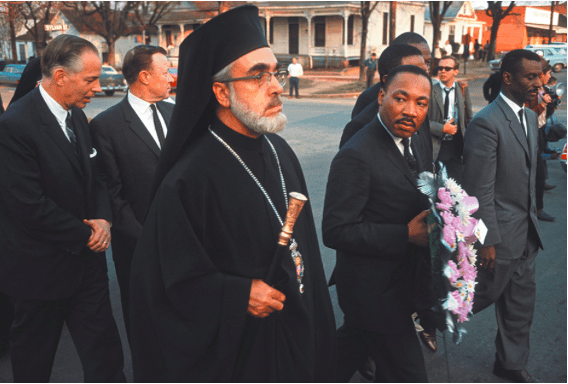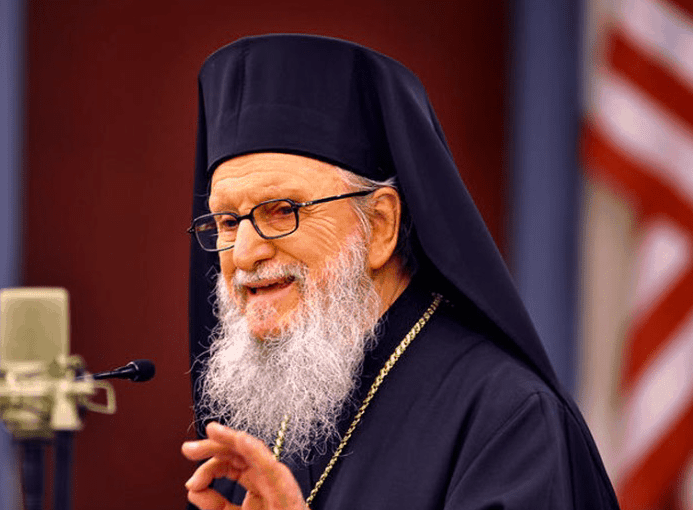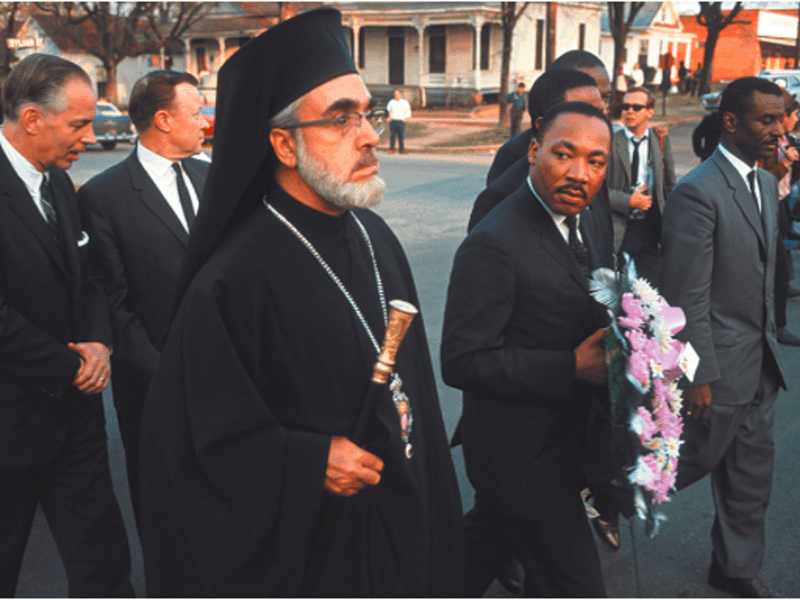
The Greek Orthodox Archdiocese of America is proud to announce that it will participate in an ecumenical initiative to end racism. The process will begin in April with the public gathering of the 38 member communions of the National Council of Churches of Christ in the USA (NCC) and all people of good will.
On the evening of April 3rd, religious and civic leaders will join the faithful and take part in the Orthodox Christian service of Holy Tuesday at the Greek Orthodox National Cathedral of Saint Sophia in Washington D.C, hosted by His Eminence Archbishop Demetrios of America.
The hymnology will reflect upon the importance of repentance and reconciliation, central components to any process to end racism.

A public rally is also planned on the National Mall, a landscaped park within the National Mall and Memorial Parks, located near the downtown area of Washington, D.C., on April 4th and is expected to draw hundreds of thousands of people from across the country.
The Greek Orthodox Archdiocese of America have been involved in the fight against racism, prejudice, and discrimination for a long time, with Archbishop Iakovos becoming one of the most prominent church leaders in America to speak out for the need of civil and human rights legislation, once he became the Greek Orthodox Archbishop on April 1, 1959.
Along with Martin Luther King Jr., Archbishop Iakovos (pictured above) and other civil rights organisers, in 1965 planned voting rights initiatives in Selma, a city in Alabama with nonviolent civil disobedience. They would distribute leaflets, hold mass meetings, organise protest marches, and fill the county jails until the country realised the voting injustices inflicted upon blacks.
In Selma that year, three marches took place, one which included the “minister’s march” from Selma to Montgomery, cities in Alabama which took place on Tuesday, March 9. At this march, hundreds of ministers, priests, rabbis, and nuns from across the country came to Selma for the march, and led a march of three thousand all walking for the same injustice.
The year also included the death of Rev. Reeb, an American Unitarian Universalist Minister, Pastor and activist who was beaten to death by white men with clubs for his support of African American rights. His death initiated the third march after Rev. Reeb’s memorial service, where most of the participants were black, but some were white and some were asian and latino. Once it had concluded, Archbishop Iakovos issued a statement to the press that read, “I came to this Memorial Service because I believe this is an appropriate occasion not only to dedicate myself as well as our Greek Orthodox Communicants to the noble cause for which our friend, the Reverend James Reeb gave his life; but also in order to show our willingness to continue this fight against prejudice, bias and persecution…Our Church has never hesitated to fight, when it felt it must, for the rights of mankind; and many of our Churchmen have been in the forefront of these battles time and time again…”
President of the United States at that time, Lyndon B. Johnson in memory of Rev. Reeb addressed Congress on the same evening of the memorial service and announced his intention to send them legislation “designed to eliminate illegal barriers to the right to vote.” This became the Voting Rights Act of 1965, which was signed into law on Aug. 6, 1965.
Over the months and years that followed the historic events in Selma, increasing numbers of Americans, both Greek and non-Greek, appreciated and expressed their admiration for Archbishop Iakovos’s role in the civil rights movement. Many scholars and historians consider the events that transpired in Selma that year the crowning moment of the civil rights movement.
Archbishop Iakovos knew that voting did more than give people a voice in their government: voting erased their invisibility. Inspired by his Orthodox Christian faith, Archbishop Iakovos believed that voting was more than a right or an expression of citizenship; it was a declaration of one’s God-created humanity. It was, therefore, just as much a human right as it was a civil right.
His Eminence understood this long before he walked with Martin Luther King Jr. in Selma when he himself grew up within a discriminated minority community in Turkey. For him, it was unconscionable that in a land founded on freedom and democracy that inequality and prejudice should prevail. Archbishop Iakovos labored tirelessly for almost four decades on human and civil rights causes for all peoples, earning him the Presidential Medal of Freedom in 1980 from President Jimmy Carter—along with his dear friend, Dr. Martin Luther King.
"The Greek Orthodox Church continues to fight against racism, prejudice, and discrimination with fervent love for God and all people. May His Eminence’s memory and all he stood for be eternal," says the Greek Archdiocese of America.
For more information about the events in April, visit: nationalcouncilofchurches.us/actnow/
For more information about the Greek Orthodox Archdiocese’s history and involvement in the civil rights movement, visit: civilrights.goarch.org
*Featured image: Archbishop Iakovos, Martin Luther King Jr., and other dignitaries walking to the Dallas County Courthouse in March 1965 to hang a funeral wreath in honor of Reverend James Reeb, a civil rights activist, Selma.
*Source credit: goarch.org


